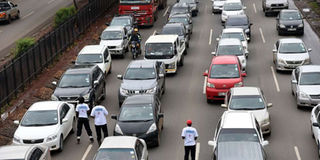Nairobi mulls car-free days to curb congestion

Mombasa Road, Nairobi on March 19,2018. PHOTO | EVANS HABIL | NATION MEDIA GROUP
What you need to know:
Nairobi residents spend on average 62.44 minutes stuck in traffic daily, according to a report.
Private motorists in Nairobi will soon be required to use other means into the city on some days as Nairobi County plans to regain its lost glory as a green city under the sun.
The Nairobi Regeneration Committee has proposed car-free days, Wednesdays and Saturdays, in the Central Business District and Westlands in a bid to decongest the city.
Transport Cabinet Secretary James Macharia, who is a member of the committee, said the proposal is part of an ambitious initiative to tackle the problem of congestion in Nairobi.
TEAMS
The committee is made up of teams from the national and county governments and is chaired by Nairobi Governor Mike Sonko and Tourism Cabinet Secretary Najib Balala.
According to a 2017 Traffic Index report by Serbia-based website numbeo.com, Nairobi residents spend on average 62.44 minutes stuck in traffic every day.
A 2007 report by the Ministry of Roads and Public Works indicated that although only 15.3 per cent of commuters in Nairobi use private cars, they account for 36 per cent of vehicles in the capital city roads compared to 29 per cent of commuters using matatus who account for only 27 percent of vehicles on the roads.
According to the same report, in 2008 the number of vehicles coming in and out of the city daily is 300, 000. But City Hall puts the number at 30,000.
On Wednesday, Nairobi County executive in charge of Roads, Transport and Infrastructure Mr Mohammed Dagane said that the move will boost the culture of using public transport in the capital city.
He added that the move will get a boost as the bus termini where matatus were supposed to be relocated to are already complete and the relocation of Public Service Vehicles (PSVs) from the city centre will be done by the end of June and will coincide with the introduction of the Bus Rapid Transport (BRT).
“We need to shift from the idea using our own vehicles coming to town every day, because you find more than three million of cars coming to the city centre and each one of them is not carrying more than one passenger,” said Mr Dagane in an interview with one of the local media.
Mr Dagane explained that the initiative, being undertaken by the county in conjunction with the Nairobi Regeneration Team, will also aid in mitigating environmental pollution, promote non-motorized transport and encourage physical exercise.
“Organized car-free days are held in various cities across the world where motorists are encouraged to give up their vehicles and has been institutionalized in some areas making it compulsory. In Kigali, Rwanda for instance, it was introduced in mid-2016 and takes place on the first Sunday of every month,” he said.
Last month, State House spokesperson Mr Manoah Esipisu touched on the same plan saying that car free days would start in Westlands and the central business district to coincide with the planned launch of the BRT system expected to be rolled out in July.
He said a traffic management committee, automation of bus terminuses, and improvement of non-motorized travel are also planned to be put in place, adding that traders would use the car-free days to showcase their wares.
“Our understanding is that bus pick up points have now been set up and those will be communicated in the coming days,” he said at the time.





